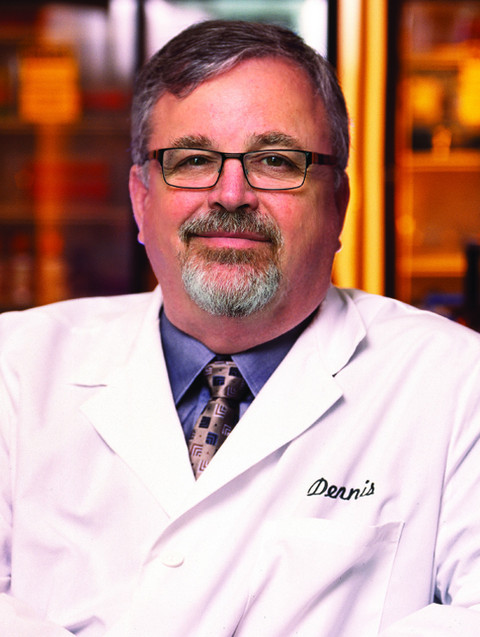Dennis Kyle, Ph.D.
Parasitic Diseases
The University of Georgia
Recruited: 2017
One of the world’s top experts on malaria and other parasitic diseases, Dennis E. Kyle heads the University of Georgia’s renowned Center for Tropical and Emerging Global Diseases. Kyle’s focus is drug resistance in parasitic diseases; his research is fueling the discovery of powerful new medicines. He was also part of the international team that identified two promising new anti-malarial drugs, ELQ-300 and SJ733.
Malaria is the world’s deadliest parasitic disease, and the parasite’s growing resistance to commonly used drugs poses even more serious dangers. One example is artemisinin, a compound derived from the sweet wormwood plant. It’s been a highly effective component in many treatments for malaria, but in recent years, researchers have begun observing artemisinin-resistant malaria, particularly in southeast Asia.
Kyle’s lab uncovered the reasons underlying the new resistance. Artemisinin works by attacking the parasite as it develops in a red blood cell, causing the parasite to become dormant. Kyle discovered the new artemisinin-resistant parasites had begun developing differently, spending much more time in their early development stage and less time in the highly metabolic stage, when they’d be most susceptible to the action of the drug.
The changes are associated with mutations in the parasite’s Kelch 13 gene. Kyle is now exploring the exact role the Kelch 13 gene plays. Understanding this mechanism is crucial because new anti-malaria drugs must be designed to overcome it.
One promising candidate is ELQ-300, which Kyle helped develop along with international colleagues. ELQ-300 targets the parasite’s mitochondria, where energy is produced, and it effectively disables the parasite at every stage of its lifecycle. Because of this approach, the drug could also prevent malaria from being transmitted by mosquitoes to humans, which might help stamp out the disease altogether.
The other new drug Kyle helped develop, SJ733, targets a parasite transporter. It appears to act faster than other drugs and as of 2017 was being evaluated in clinical trials.
In 2010, Kyle began leading another groundbreaking project. Working with a group of engineers, and with the backing of the Bill and Melinda Gates Foundation, Kyle’s team discovered a way to create a human liver cell in a laboratory and to keep it functioning for at least six weeks. Before the discovery, there was no way to maintain liver cells in vitro, so there was no safe way to test the effectiveness of potential drugs.
The breakthrough will allow Kyle and other researchers to develop drugs to treat Plasmodium vivax, a particularly dangerous malaria parasite that remains in the liver for years, causing chronic relapses. The only drug available to combat the parasite causes severe side effects for many people. Kyle and his team are the first to identify and test new drug compounds for Plasmodium vivax on parasite-infected liver cells in the laboratory.
Another focus of Kyle’s research is an extremely rare but highly fatal disease caused by the Naegleria fowleri brain-eating amoeba. The disease is called primary amoebic meningoencephalitis, or PAM; its fatality rate is about 97 percent. People who contract the disease usually get it by being exposed to warm water that harbors the amoeba, often while swimming. Though highly uncommon, incidences of the disease are tragic, striking down healthy young people within two weeks of exposure.
Because of its rarity, few researchers are pursuing a cure for the disease. Kyle has received three grants from NIH to develop treatments. His current focus is a drug that works fast enough to begin killing the parasite within 12 to 24 hours of symptoms appearing, which could be the key to survival. His team has identified two new drug compounds that are 500 times more potent than current drugs. While these compounds are still undergoing testing, they could lead to life-saving new medicines.
Research
- Antiparasitic drugs for malaria and visceral leishmaniasis
- Mechanisms of drug resistance in parasitic diseases
- Human liver models for malaria drugs
- Naegleria fowleri and primary amoebic meningoencephalitis
Straight from the Scholar
“What drew me to the University of Georgia is the Center for Tropical and Emerging Global Diseases. It’s really a crown jewel, one of the largest centers where people focus on these neglected tropical diseases caused by parasites. There are 25 different fantastic groups of cutting-edge scientists, working on a whole range of different diseases. When you get that sort of group together there’s this synergy of effect. Even before I was asked to come here, I recognized the Center as the leader in this area. So I’m very excited to be in this position, and humbled by the depth and breadth of my colleagues at UGA.”
Intellectual Property
15 patents

